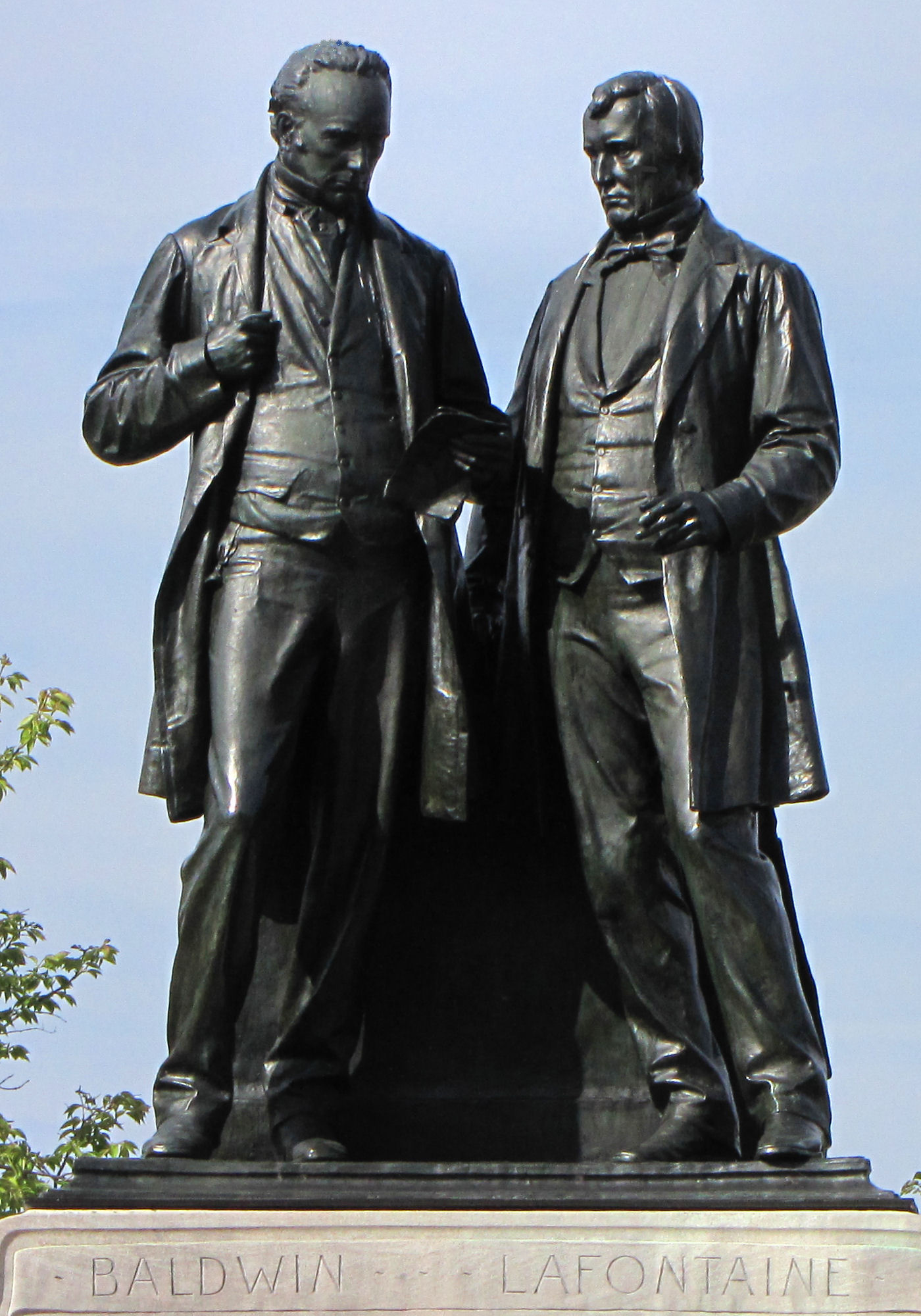Article
Province House, Charlottetown
Province House in Charlottetown is the home of Prince Edward Island's Legislative Assembly.

Enter your search term
Signing up enhances your TCE experience with the ability to save items to your personal reading list, and access the interactive map.
Create AccountArticle
Province House in Charlottetown is the home of Prince Edward Island's Legislative Assembly.
"https://www.thecanadianencyclopedia.ca/images/tce_placeholder.jpg?v=e9dca980c9bdb3aa11e832e7ea94f5d9" // resources/views/front/categories/view.blade.phphttps://www.thecanadianencyclopedia.ca/images/tce_placeholder.jpg?v=e9dca980c9bdb3aa11e832e7ea94f5d9

Article
In 1841, Britain united the colonies of Upper and Lower Canada into the Province of Canada. This was in response to the violent rebellions of 1837–38. The Durham Report (1839) recommended the guidelines to create the new colony with the Act of Union. The Province of Canada was made up of Canada West (formerly Upper Canada) and Canada East (formerly Lower Canada). The two regions were governed jointly until the Province was dissolved to make way for Confederation in 1867. Canada West then became Ontario and Canada East became Quebec. The Province of Canada was a 26-year experiment in anglophone-francophone political cooperation. During this time, responsible government came to British North America and expanded trade and commerce brought wealth to the region. Leaders such as Sir John A. Macdonald, Sir George-Étienne Cartier and George Brown emerged and Confederation was born. (This is the full-length entry about the Province of Canada. For a plain language summary, please see Province of Canada (Plain Language Summary).)
"https://d3d0lqu00lnqvz.cloudfront.net/media/media/dcae055f-192e-4de7-b004-4a70146eca56.jpg" // resources/views/front/categories/view.blade.phphttps://d3d0lqu00lnqvz.cloudfront.net/media/media/dcae055f-192e-4de7-b004-4a70146eca56.jpg

Macleans
With the exception of Nova Scotia, every province has tabled its 1998-1999 budget.This article was originally published in Maclean's Magazine on June 8, 1998
"https://www.thecanadianencyclopedia.ca/images/tce_placeholder.jpg?v=e9dca980c9bdb3aa11e832e7ea94f5d9" // resources/views/front/categories/view.blade.phphttps://www.thecanadianencyclopedia.ca/images/tce_placeholder.jpg?v=e9dca980c9bdb3aa11e832e7ea94f5d9

Macleans
The atmosphere was at once optimistic and wary. As they arrived in Saskatoon for last week's premiers' conference, provincial officials thought the stars were lining up for an agreement on a united front to carry them into negotiations with Ottawa on social programs.This article was originally published in Maclean's Magazine on August 17, 1998
"https://www.thecanadianencyclopedia.ca/images/tce_placeholder.jpg?v=e9dca980c9bdb3aa11e832e7ea94f5d9" // resources/views/front/categories/view.blade.phphttps://www.thecanadianencyclopedia.ca/images/tce_placeholder.jpg?v=e9dca980c9bdb3aa11e832e7ea94f5d9

Article
Under Canada’s federal system, the powers of government are shared between the federal government and 10 provincial governments. The Constitution Act, 1867 granted specific jurisdiction to the provinces in 16 areas, compared to 29 for the federal government. However, provincial powers have expanded since then. Provinces can levy direct taxation and derive most of their non-tax revenue from the use of public lands and natural resources. Provincial governments in Canada are modelled on the British Westminster parliamentary tradition and reflect the principles of responsible government. They comprise an elected legislative assembly, from which a governing cabinet is selected by the premier. The lieutenant-governor assents to legislation as the representative of the Crown.
"https://d3d0lqu00lnqvz.cloudfront.net/media/media/b71f52d6-44fe-46cd-9248-27a0ae355508.jpg" // resources/views/front/categories/view.blade.phphttps://d3d0lqu00lnqvz.cloudfront.net/media/media/b71f52d6-44fe-46cd-9248-27a0ae355508.jpg

Article
On 9 May 1991 Provincial Orders were incorporated into the Order of Precedence for Canadian Orders, Declarations and Medals through Order in Council approved by the government of Canada.
"https://www.thecanadianencyclopedia.ca/images/tce_placeholder.jpg?v=e9dca980c9bdb3aa11e832e7ea94f5d9" // resources/views/front/categories/view.blade.phphttps://www.thecanadianencyclopedia.ca/images/tce_placeholder.jpg?v=e9dca980c9bdb3aa11e832e7ea94f5d9

Article
Research, Provincial Organizations All provinces except Newfoundland and PEI have provincial research organizations functioning to promote economic development through the application of modern TECHNOLOGY to regional INDUSTRY.
"https://www.thecanadianencyclopedia.ca/images/tce_placeholder.jpg?v=e9dca980c9bdb3aa11e832e7ea94f5d9" // resources/views/front/categories/view.blade.phphttps://www.thecanadianencyclopedia.ca/images/tce_placeholder.jpg?v=e9dca980c9bdb3aa11e832e7ea94f5d9

Article
Public administration has no generally accepted definition. The scope of the subject is so great and so debatable that it is easier to explain than define. Public administration is both a field of study, or a discipline, and a field of practice, or an occupation.
"https://www.thecanadianencyclopedia.ca/images/tce_placeholder.jpg?v=e9dca980c9bdb3aa11e832e7ea94f5d9" // resources/views/front/categories/view.blade.phphttps://www.thecanadianencyclopedia.ca/images/tce_placeholder.jpg?v=e9dca980c9bdb3aa11e832e7ea94f5d9

Article
In 1867 Canada's debt was $94 million and it grew slowly until 1915, when WWI pushed the figure to $2.4 billion. During the Great Depression the debt rose to $5 billion, and by the end of WWII it had reached $18 billion.
"https://d3d0lqu00lnqvz.cloudfront.net/media/media/3fcf1b3a-455a-4717-9c35-d4c5ef5e1555.jpg" // resources/views/front/categories/view.blade.phphttps://d3d0lqu00lnqvz.cloudfront.net/media/media/3fcf1b3a-455a-4717-9c35-d4c5ef5e1555.jpg

Article
For many economic purposes, however, the total size of government expenditures is less significant than the components of these expenditures.
"https://d3d0lqu00lnqvz.cloudfront.net/media/media/c824ad23-8456-4358-ab46-7ccd00b6d5c8.jpg" // resources/views/front/categories/view.blade.phphttps://d3d0lqu00lnqvz.cloudfront.net/media/media/c824ad23-8456-4358-ab46-7ccd00b6d5c8.jpg

Article
The relative importance of government expenditures in the Canadian economy has risen dramatically over the past 70 years, from 15% of the Gross Domestic Product (GDP) in the late 1920s to 40% of GDP in 1980 and 50% in the early 1990s.
"https://d3d0lqu00lnqvz.cloudfront.net/media/media/9dd1c1a6-6a3d-438f-ae21-feb4a339a61b.jpg" // resources/views/front/categories/view.blade.phphttps://d3d0lqu00lnqvz.cloudfront.net/media/media/9dd1c1a6-6a3d-438f-ae21-feb4a339a61b.jpg

Article
Illness and disease are communal problems. While individual interventions can have an impact, they are less effective than measures that can be done at a community level. Preventing disease and promoting health among individuals and the population at large is the purpose of public health. Public health is managed by local, regional, national and international public health authorities. Public health interventions include research, prevention, education and emergency preparedness. The most important public health interventions for reducing mortality over the past 150 years have included cleaning the water and air, making roads safer and immunizing against infectious diseases. Ironically, as is often said by public health practitioners, success in public health is often invisible when measures are working. In Canada, the rapid emergence, urgency, severity, global scope and long persistence of the COVID-19 pandemic has put all aspects of public health in the public and political spotlight to a greater degree than ever before. For some Canadians, this has resulted in a loss of confidence in public health authorities, while others have realized the importance of maintaining and funding public health. This is the full-length entry about Public Health in Canada. For a plain-language summary, please see Public Health in Canada (Plain-Language Summary).
"https://d3d0lqu00lnqvz.cloudfront.net/e002504596.jpg" // resources/views/front/categories/view.blade.phphttps://d3d0lqu00lnqvz.cloudfront.net/e002504596.jpg

Article
The Public Interest Advocacy Centre, a non-profit Ottawa based organization, was founded in 1976. PIAC is primarily concerned with the delivery of important public utilities and services to Canadian consumers and, in particular, vulnerable consumers.
"https://www.thecanadianencyclopedia.ca/images/tce_placeholder.jpg?v=e9dca980c9bdb3aa11e832e7ea94f5d9" // resources/views/front/categories/view.blade.phphttps://www.thecanadianencyclopedia.ca/images/tce_placeholder.jpg?v=e9dca980c9bdb3aa11e832e7ea94f5d9

Article
Public ownership refers to government provision of goods and services; the commercial or business activities of the STATE.
"https://www.thecanadianencyclopedia.ca/images/tce_placeholder.jpg?v=e9dca980c9bdb3aa11e832e7ea94f5d9" // resources/views/front/categories/view.blade.phphttps://www.thecanadianencyclopedia.ca/images/tce_placeholder.jpg?v=e9dca980c9bdb3aa11e832e7ea94f5d9

Article
Public Policy generally denotes both the general purpose of government action and the views on the best or preferred means of carrying it out; more specifically it refers to government actions designed to achieve one or more objectives.
"https://www.thecanadianencyclopedia.ca/images/tce_placeholder.jpg?v=e9dca980c9bdb3aa11e832e7ea94f5d9" // resources/views/front/categories/view.blade.phphttps://www.thecanadianencyclopedia.ca/images/tce_placeholder.jpg?v=e9dca980c9bdb3aa11e832e7ea94f5d9
